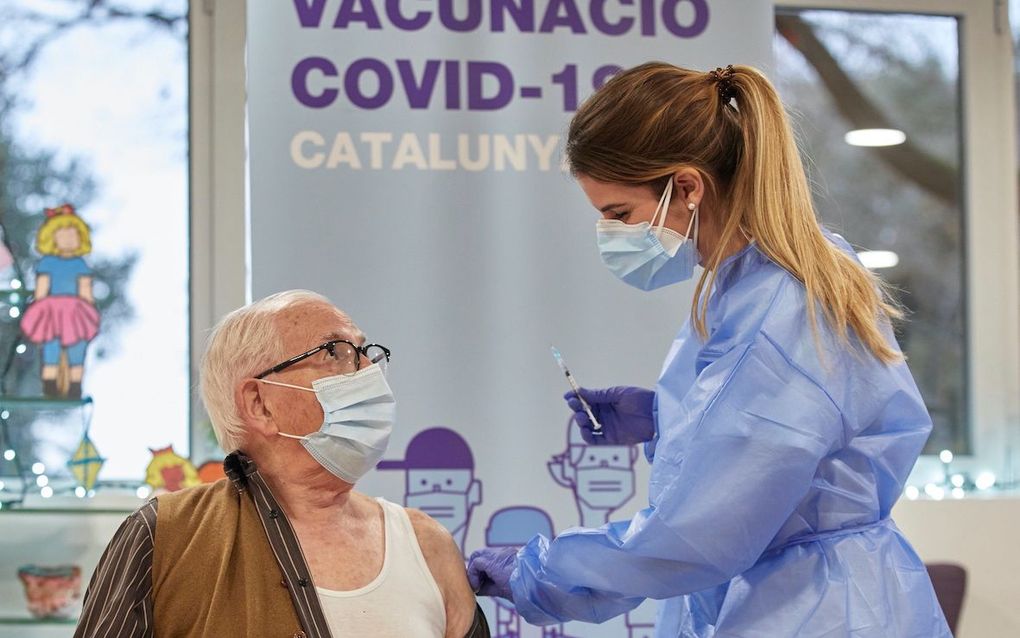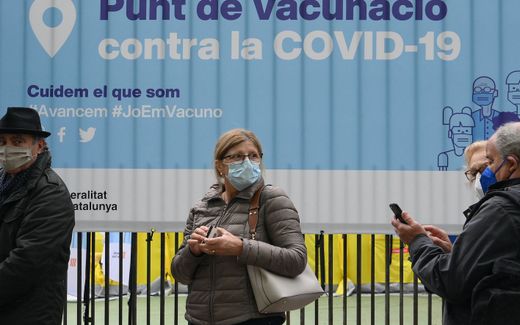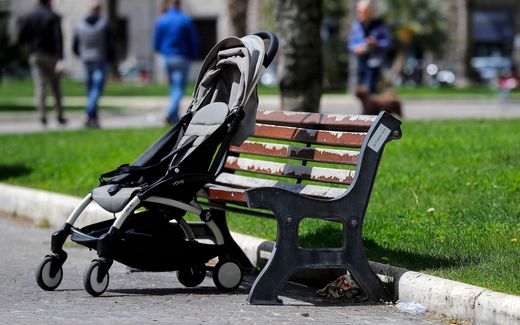Weekly column: Showing Covid-passport in church? Must be a joke
21-01-2022
Christian Life
Jorge Ruiz, CNE.news

Vaccination in Catalonia. Photo EPA, David Borrat
Christian Life
That Friday afternoon, we held, like every week, a prayer meeting in the church. Our meeting place is opposite a small building that functions as a mental health centre.
When we arrived at the church, we were surprised to see a queue of people several tens of metres long starting at the centre and disappearing around the corner. “What could have happened to make so many people suddenly come to the clinic,” we asked ourselves.
Jorge Ruiz (1969) was born in Barcelona, Spain. At the age of 19, he was converted to the Christian faith.

He graduated in Journalism at the University of Barcelona and received a PhD in Theology at the Faculté Libre de Théologie Réformée in Aix-en-Provence, France. He serves as a Protestant pastor in Spain. He is assessor for the Trinitarian Bible Society for the Spanish and French projects. He is married and father of four.
We had already predicted the answer before we went home and were able to look at the news. It confirmed our guess: that Friday afternoon was the theoretical deadline for the Covid passport to be introduced in the autonomous region of Catalonia.
Only for one week
The next day, we found out that the Covid Passport had not come into force that day, as planned, but would be implemented the following Monday. The reason that was given was that so many people downloaded the app of the Catalan health service on Friday that the website of the service crashed.
On Monday, there was no information provided on whether the Covid passport had come into force or not. But reading a bit further, one could find, usually at the end of the related news, that the Court of Justice of Catalonia had granted the regional government permission to introduce the Covid passport in the autonomous region, only for one week! And that, if it wanted this permission to be extended, it would have to be better substantiated.
Whether or not the Catalan autonomous government officially introduced the Covid passport on that Monday, the following Friday, or even today, is irrelevant. What is essential is that a large part of the population went to get vaccinated at the last minute voluntarily to get the corona pass and that the passport has started to be implemented in different sectors of society, also, always voluntarily.
Seven observations
This illustrates quite well how the Covid passport has been implemented in my country, Spain. It can be summarised in the following steps.
Firstly, the central government in Madrid has been inhibited in this potentially controversial issue with the population, leaving the decision about the Covid passport to each autonomous region.
Secondly, the leaders of the different autonomous regions in Spain have usually been fervent supporters of the implementation of the Covid passport in their respective territories – if only because that way they could wield powers comparable to heads of State in times of war, breaching fundamental rights of the population in their personal war against the virus.
Thirdly, the Covid pass was initially challenged by various civic associations before the regional courts of justice. The regulations violated fundamental rights and data protection laws – an important detail that the media usually did not mention. The courts of justice routinely overturned these legal implementations.
Fourthly, the regional governments have responded to the court decisions by insisting time and again on the implementation of the Covid passport.
Fifthly, the territorial courts of justice have gradually relented, granting partial permits for the application of the Covid passport, usually related to leisure or visits to hospitals or nursing homes.
Sixthly, on December 20th, the President of Spain announced the national application of the passport from February 2022, after a meeting with the regional presidents. This Covid pass will be valid only for vaccinations received in the last six months. This period can be ‘generously’ extended, as a “temporary measure of grace”, for a further three months.
Seventhly, in any case, as of today, there are still three autonomous regions that refuse to apply for the Covid passport in their territories.
A kind of joke
This is how the Covid passport –which is still an imposition of various transnational organisations– will be implemented nationally in Spain.
Indeed, these are serious things, but they can also be seen as a joke. I could go on at length to try to explain the Latin way of being and mentality. But, as the Spanish saying goes: “A buen entendedor, pocas palabras bastan” (A word to the wise is enough).
Very few bars will stop serving you a coffee at the counter because you don’t present your corona pass.
That is why it would be an enormous pity if, in Spain, as elsewhere, the leaders of Evangelical churches were to ask people to show their Covid passport to attend the worship even though I know that this is very difficult nowadays.
Worldwide, only some odd, solitary, very progressive congregations have dared to require a Covid pass. But pressure from serious, if not relentless, governments about the Covid pass in some Western countries may increase on the churches. That can cause a domino effect. Especially if one of the Protestant State churches, or the Roman Catholic Church itself, decides to apply it.
Good citizenship
For me, to apply the Covid passport to attend church worship would be, in a word, a betrayal to the One who is the only Head of the Church, the Lord Jesus Christ. For it would give, in practice, the State the power of ex-communication in the church, as the government would be able to deprive believers of communion based on a kind of supposedly “good citizenship” document.
Therefore, as we are still in time to say it, the Covid passport in churches: that must be a joke.
Related Articles





